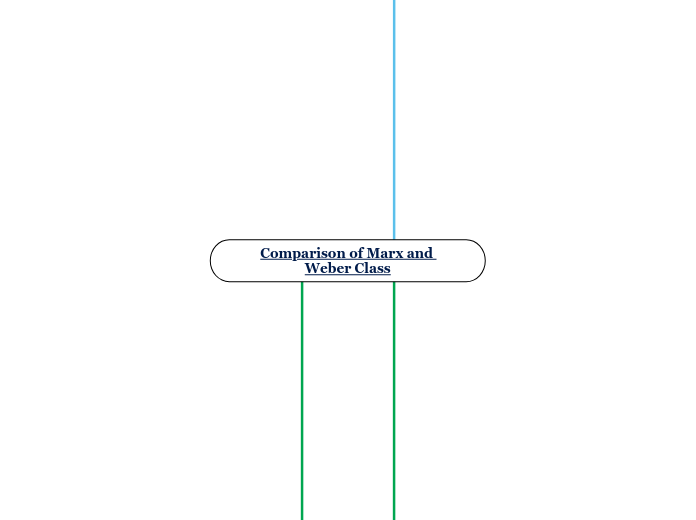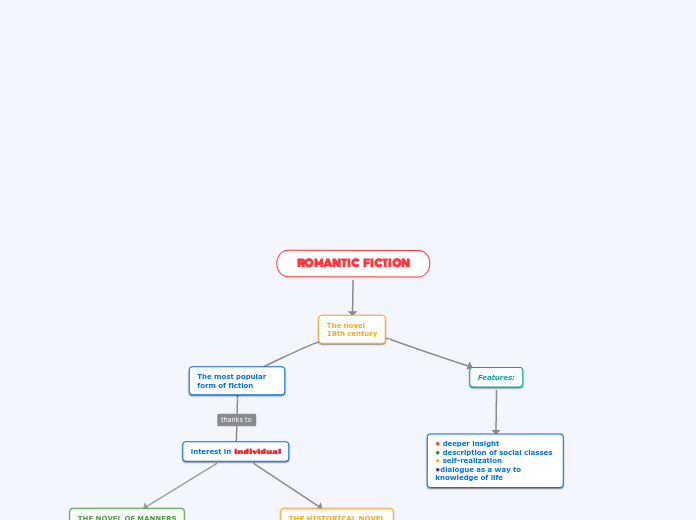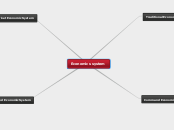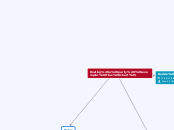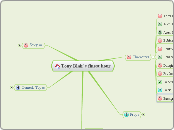Comparison of Marx and Weber Class
Reference
Stewart, P. and Zaaiman, J. eds. 2018. Sociology: A concise South African introduction. Cape Town: Juta and Company.
Reference
Pandey, M. 2016. Health- A Sociological Perspective: An Overview. International Journal for innovative research in multidisciplinary field, 2(10): 2455- 0620. [Online]. Available at: https://www.ijirmf.com/wp-content/uploads/2016/11/201610046.pdf [Accessed 31 August 2023].
Stewart, P. and Zaaiman, J. eds. 2018. Sociology: A concise South African introduction. Cape Town:
Weber's theory of class
1. Rationalisation and class: Social action and social actions of collectivities are constantly required to conform to legal-rational forms of social action (Stewart & Zaaiman, 2018).
- Bureaucracy and growth in rationalisation in society to an extent that Weber provided the demise of slavery to the lack of rationality and capability in the economy under slavery (Stewart & Zaaiman, 2018).
2. Class interests and social action: Weber views class as a related interest connected to the market, which involve an exchange of property, skills and abilities for income and other assets (Stewart & Zaaiman, 2018).
- Thereby for Weber, the way social action is structured is essential to understanding the relation between class as planted in the market economy and the amount to which society as a whole is becoming increasingly rationalised (Stewart & Zaaiman, 2018).
- Unlike Marx, Weber did not presume that outsiders or insider-activists speaking in the name of the class would determine how interests would be translated and what action should be taken hence, Weber's theory is flexible and open to diverse outcomes
3. Status and party: Weber recognised the economic nature of class and class situations wherein he acknowledged other forces such as status and party which played a vital role in the process of interpreting class positions into communal identities and police action (Stewart & Zaaiman, 2018).
- Status groups who find themselves in the same status situation do not have a clear structure and are based on social estimation of prestige (Stewart & Zaaiman, 2018).
- Status on class can act to reduce economic inequalities and partially reinforce them
- Weber's theory of class consists of rationalisation and class, class interests and social action as well as, status and party (Stewart & Zaaiman, 2018).
- Weber defines class as any group of people who have the same typical chance for a supply of goods, external living conditions and personal life experiences (Stewart & Zaaiman, 2018).
- Weber provides more detailed, multidimensional view of social stratification (the division of society into social groups) (Stewart & Zaaiman, 2018).
- Moreover, he proclaims that for individuals to understand society, it is important to recognise how power underpins the way in which society was socially stratified (Stewart & Zaaiman, 2018).
Marx theory of class
- The two classes built on the increasing growth of markets, territorial expansion, technological innovation and ever-changing social relations thereby, Marx named this capitalism (Stewart & Zaaiman, 2018).
- Capitalism resulted in unprecedented economic growth and guaranteed huge profits for the bourgeoisies (Stewart & Zaaiman, 2018).
- Marx critiqued that capitalism has a critical weakness whereby for capitalism to succeed, a large number of workers need to be employed because their labour is required for the industrial production of goods to be sold into the marketplace and also it creates an opportunity to organise in order to defend and promote their interests (Stewart & Zaaiman, 2018).
3. Class as a relation: For Marx, class expresses a relation (who owns and does not own the means of production) such as land, raw materials, tools, equipment, machinery, factories and mines (Stewart & Zaaiman, 2018).
- The productive forces in society consists of the means of production and includes the development of machinery and technology, sources of energy and the education of the proletariat as well as science (Stewart & Zaaiman, 2018).
- Moreover, for Marx, class captivates how historically, the 2 classes are coordinated, and stand opposed to one another under capitalism therefore, class should not be understood as a static concept but as a relation (Stewart & Zaaiman, 2018).
- The combination of class material inequality and various degrees of consciousness lead to class and political organization and struggle over power (Stewart & Zaaiman, 2018).
1. Class as the starting point: According to Marx, classes only emerged as social relations became more emphasised with the division of labour (Stewart & Zaaiman, 2018).
2. Class formation: What begins as a series of relations of production between individuals soon transits into relationships between various of social groups (Stewart & Zaaiman, 2018). Thereby, Marx views that class identifies the antagonisms between social groups which arise within the historical process in successive modes of production (Stewart & Zaaiman, 2018).
4. Class conflict and class struggle: The conflict relation is a perpetual and irreconcilable tension despite overt or covert, whether hidden in production or bursts open in society overall, it consists of a clash between direct producers and those who own & control the means of production (Stewart & Zaaiman, 2018).
- Furthermore, for Marx, class struggle gives the 'motor of history' which is a dynamic structural tension that propels any class-divided society forward and lies at the heart of social change (Stewart & Zaaiman, 2018).
5. Class consciousness: The notion of class consciousness means understanding a specific group of people has of itself which for Marx was central however, he used the context of class in an objective and subjective sense (Stewart & Zaaiman, 2018).
- Marx used the context of class 'in-self' as a reference to a particular group of people who belong to the working class or capitalist class (Stewart & Zaaiman, 2018).
- Marx defines class as a production (exploitation) and also defines class in terms of ownership of economic resources (means of production) (Stewart & Zaaiman, 2018).
- Moreover, Marx provides a single aspect of stratification namely, class (Stewart & Zaaiman, 2018).
- Most workers interests are inherently different from capitalists whereas capitalists want to increase their profits and reduce production costs whilst maximising production (Stewart & Zaaiman, 2018).
- Marx theory of class consists of class as the starting point, class formation, class as a relation, class conflict and struggle, class consciousness (class understood as 'objective'/ 'in-itself' and class understood as 'subjective'/'for-itself'), class and material inequality also, class and politics (Stewart & Zaaiman, 2018).
- For Marx, it was important to recognise that people did not operate in society as individuals only however, as members of larger units called classes (Stewart & Zaaiman, 2018).
- Marx divided society into 2 emerging classes called the bourgeoisie (capitalist class) and the proletariat (working class) thereby, the system of production in which the 2 classes operated was built on the constant growth of markets, territorial expansion, technological innovation and ever-changing social relations (Stewart & Zaaiman, 2018).
